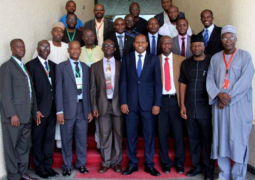Omar Bun Njie, director of Food Standard Quality and Hygiene Enforcement Directorate at the Ministry of Health and Social Welfare, has called on food producers and sellers to ensure they sell good food to the public.
"Food is one of the few commodities that people consume and so when produced for sale, one has the responsibility not to hurt or injure his or her customers," he said.
Mr Njie made these remarks while speaking at a two-day validation forum on bisecurity and draft food safety held at NANA conference hall in Kanifing.
"Food safety control is therefore a cross-cutting issue and therefore calls for concerted effort from all stakeholders, both private and public," he said.
"It is in this vein that the Ministry of Health and Social Welfare, in partnership with our traditional donor partners WHO, developed annual POA to strengthen food safety activities."
He added that plans are under way to bringing food safety control mechanisms in The Gambia under one umbrella by establishing a food safety authority.
Mr Njie added that a new food safety bill has been drafted to supersede the 2005 Food Act. "Nonetheless, this workshop is very timely hence the enhancement of these policies will serve to facilitate the coming in of important regulations linked to the existing legislations for more effective food control systems in the country," he said.
He also said food is central to the prosperity, health and social well-being of individuals and societies, adding that strengthening food safety within The Gambia will help to decrease the burden of food borne diseases, reduce poverty and achieve Millennium Development Goals 1, 4 and 8.
"This require sound policies and operational coordination at the national level," he added.
Mr Njie said the establishment of regulatory measures, such as the National Food Act 2005 and the completion of the new draft Food Bill 2010, mark the cradle of effective food control systems, appropriate for monitoring performance, facilitating continuous improvement in food safety in The Gambia.
"These legal instruments serve as effective tools and guidance to bring sanity in the food business at the national level, which include street foods, food premises, and food of plants or animals origin imported or exported in and outside the
"It is prudent to know that the then existing Food Hygiene and Safety Unit of the Ministry of Health and Social Welfare is being merged with the newly created Food Standards Unit to constitute the Food Standards, Quality and Hygiene Enforcement Directorate.
"We will therefore continue to search and solicit for any genuine support from our traditional donor partners and other possible funding sources to continue pursuing a more rigorous and comprehensive food safety controls at the national level, which if enhanced will go a long way in bringing sanity in food safety and will no doubt impact on the quality of life of the local population."
The executive director of National Nutrition Agency (NaNA), Pa Momodou Phall, said he was delighted at the holding of a forum on the validation of the bisecurity on food safety draft instrument.
He added that the forum was "very timely as the national codex committee has reached at a milestone in the development of food safety and food control in The Gambia".
The NaNA boss added that the forum will give the stakeholders the opportunity to discuss burning issues of great concern and map a way forward in the control of food safety.
Mr Phall said: "Since the national codex committee has discovered that there are gaps, there is need to take a new dimension in addressing food hygiene and safety in this country."
Read Other Articles In Article (Archive)
BIACCU and membership development in society
May 20, 2010, 1:15 PM



